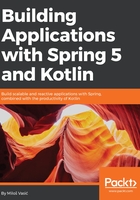
What this book covers
Chapter 1, Starting Up, starts preparing the working environment by setting up Git repositories. After we do that, we will use Gradle as a tool to shape our project and its modules.
Chapter 2, Starting with Spring, shows how to set up our development environment. We will be ready to create our first Spring code written in Kotlin.
Chapter 3, Building Your First Spring RESTful Service with Kotlin, defines the Spring project and lists examples along with tips on how to write nice and clean REST services with Spring using Kotlin.
Chapter 4, Working with Spring Data JPA and MySQL, describes Spring Data. We will see how to create a data repository with CRUD operations on some entity. Finally, we will learn how to make queries on the MySQL database.
Chapter 5, Securing Applications with Spring Security, presents Spring Security projects and shows some examples of how to utilize Basic Authentication and/or OAuth2.
Chapter 6, Spring Cloud, explains the difference between the microservice architecture and SOA. At the end, we will see how to use the Spring Cloud project to implement the microservice architecture in its own application.
Chapter 7, Using Project Reactor, discusses the advantages of reactive programming. We will present Project Reactor and teach the reader how to use its power in its applications.
Chapter 8, Development Practices, talks about some good and some not-so-good practices.
Chapter 9, Testing, explains the importance of well-tested code. We will see how to write JUnit tests with Kotlin and how to write tests for Spring-based applications.
Chapter 10, Project Deployment, finally, presents the different options for deploying Spring applications. We will also see how to deploy REST service to the Tomcat application server or to AWS. If you are a fan of AWS, this is a great topic for you!